Humans of Covid-19
Free State doctor: ‘This pandemic has changed everything’
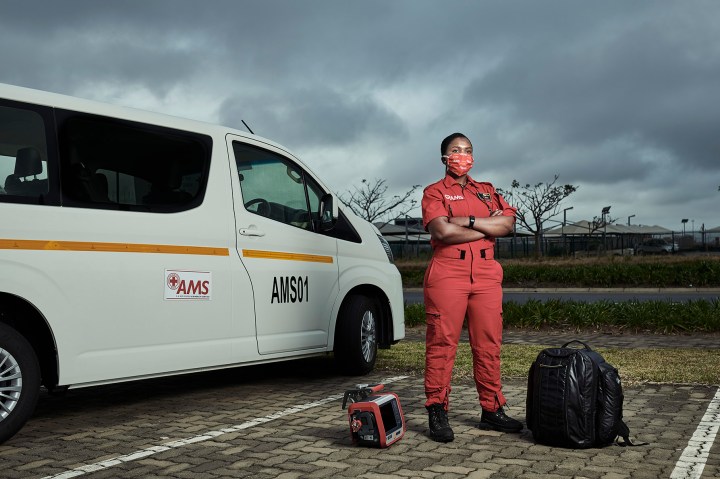
Maverick Citizen this week shares the stories of 26 workers who have been at the frontline of the Covid-19 response. These men and women work in health facilities in the nine provinces, some as doctors, others as nurses and some as mortuary workers, cleaners and porters. Journalist Nomatter Ndebele and photographer Thom Pierce undertook the challenging task of crisscrossing the country, at times under tight lockdown regulations, to document the stories of these incredible people who do not view themselves as heroes. In the fourth episode they go from Gauteng to the North West, the Free State and KwaZulu-Natal.
Read Episode 1 here, Episode 2 here and Episode 3 here.
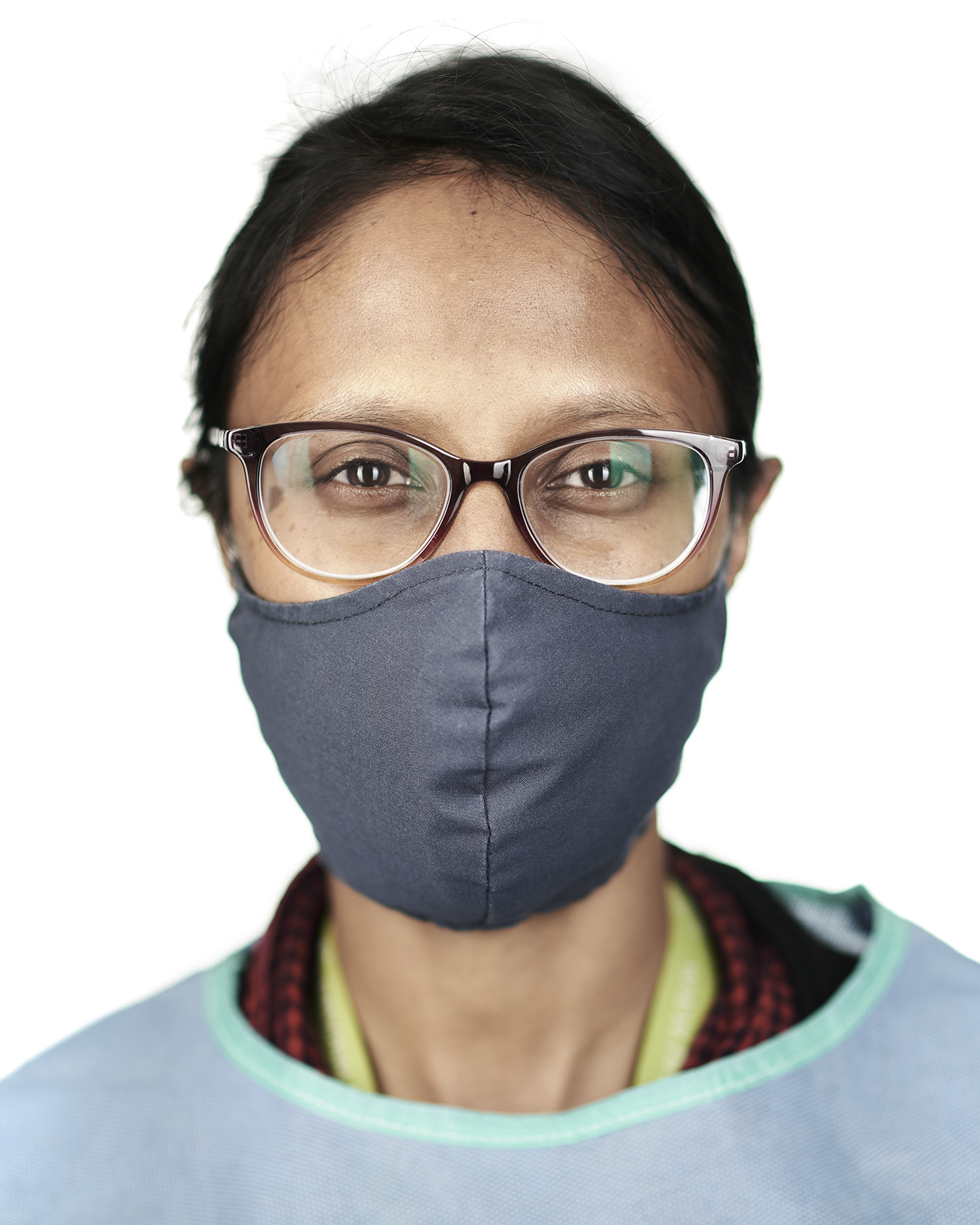
Jinal Bhiman, Johannesburg, Gauteng. (Photo: Thom Pierce)
Jinal Bhiman, Medical Scientist, NICD, Gauteng
For many of us, our anxieties and worries around Covid-19 started when the government put the country into lockdown. Unbeknownst to the rest of us, however, medical scientist at the National Institute for Communicable Diseases Jinal Bhiman and her team had been in a race against time from the middle of January. Long before thousands of us even knew we had a problem, medical scientists like Bhiman were already working on a solution.
The team at the NICD put their heads together and started to develop a test kit. This was the first momentous task that the team was faced with. They needed to create a test that would allow Covid-19 infections to be identified.
“We tested for a month and a bit, and for the longest time we had nothing. We started to worry that our test was not picking the virus up,” said Bhiman.
The team continued their work every day and held their breath every night. Many people at the NICD volunteered to take up shifts and many of the old hands committed to long hours for weeks on end in the hope that their test kit would yield results.
Finally, the team had a breakthrough. “It was actually my daughter’s first birthday and that evening the usually prompt update on the team’s WhatsApp group was late. That was the first sign,” she recalled. The moment they had been waiting for finally arrived, but it was a bittersweet moment.
“We were pleased that we picked it up, but it also meant that someone was ill,” said Bhiman.
After that, the team shifted its focus to expanding testing kits and advising the government.
The work at the lab has not stopped – the team has now taken the role of monitoring the virus and conducting research. Its efforts are driven towards advising and assisting other African countries.
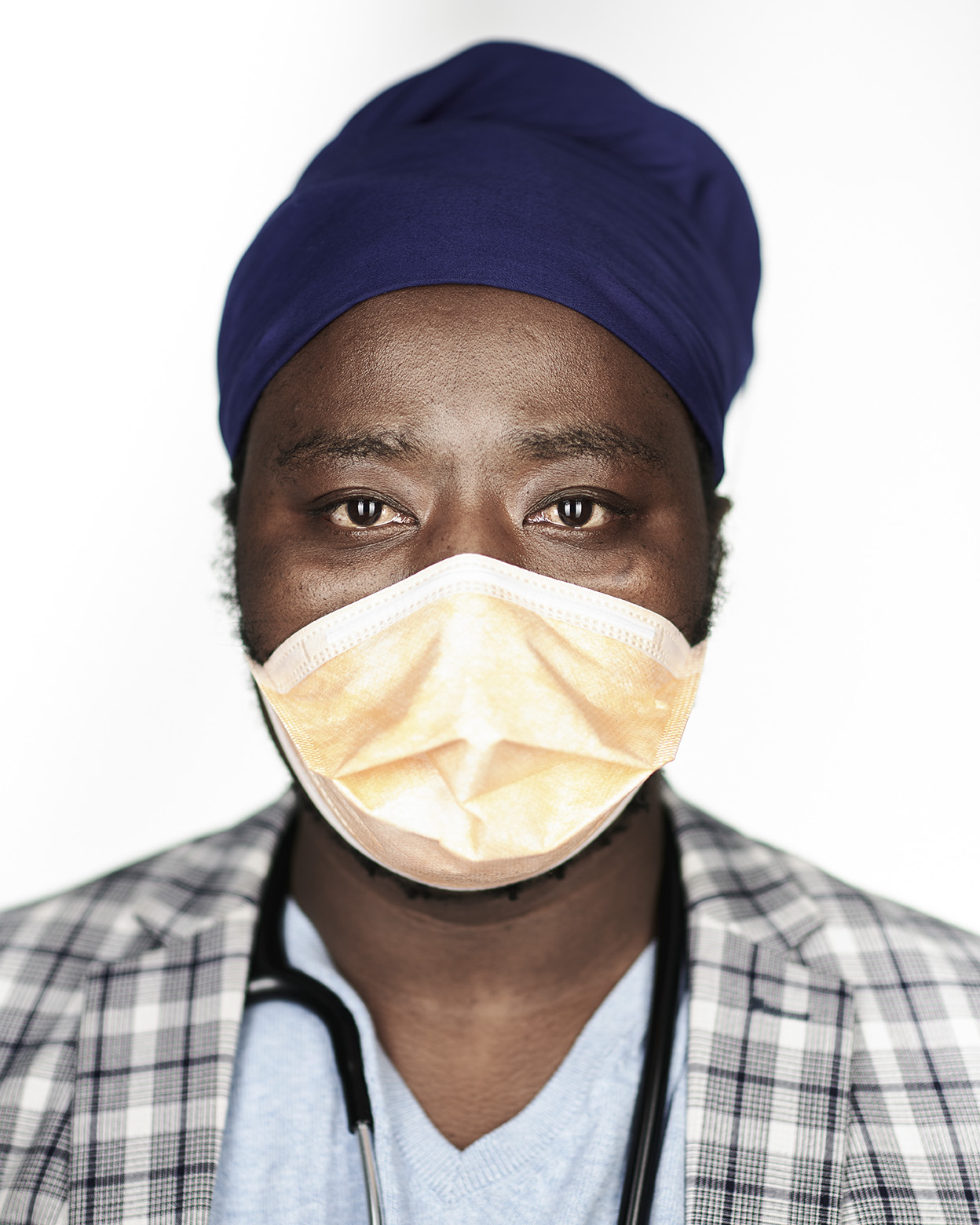
Mohale Setlaba, Phutadijaba, Free State. (Photo: Thom Pierce)
Mohale Setlaba: Doctor, Free State
Dr Mohale Setlaba has worked at Elizabeth Ross District Hospital in Phuthaditjhaba in the Free State for 10 years. When it became clear that South Africa had diagnosed its first positive case, Setlaba knew that it was time to act. He was not prepared to wait for a crisis. One could say that while others shied away from the impending disaster, Setlaba walked straight towards it.
Assisted by the Department of Health in the Free State, Setlaba led a group of clinicians on a knowledge exchange programme at Universitas Hospital in Bloemfontein. Over weeks, Setlaba and his colleagues learnt the ins and outs of how to set up a Covid-19 ward.
They also participated in webinars where they learnt more about the virus and its treatment options. By the time Elizabeth Ross diagnosed its first Covid-19 positive case, the team was ready.
Reflecting on the ways the pandemic has changed his work, Setlaba said, “This pandemic has changed everything, even the practice of medicine itself.” While hospital facilities have continued to provide healthcare services, greater consideration has had to be given to the way in which those services are provided. While most patients used to be able to move somewhat freely in facilities, movement has become much more restricted. It is simply not feasible for patients and staff to be moving everywhere. “In the past, if a patient came in with a cough, we would send them for X-rays, but now we can’t have patients just walking into various departments because we don’t know their [Covid-19] status. Now we have mobile X-ray [equipment] that we bring to the patients,” Setlaba explained.
Being a district hospital, Elizabeth Ross provides medical services to hundreds of people, and then some. When local clinics close at 4pm, Elizabeth Ross becomes both a clinic and a hospital as people turn to the hospital for assistance after hours. This is something many healthcare practitioners working in rural areas have become accustomed to, but in the throes of a pandemic staff shortages are more apparent as hospital workers contract the virus, and are required to undergo mandatory quarantine periods.
While the numbers in the Free State have remained relatively low, Setlaba and his team have already endured the highest of highs and the lowest lows. In one weekend the team discharged three elderly patients aged 83, 87 and 93, who had made full recoveries.
But the team also lost a 35-year-old woman. The patient had been referred to the hospital by a local clinic. Dr Setlaba received the patient, who presented with respiratory issues. She was admitted to the hospital and stabilised. When her condition started to deteriorate she was transferred to Universitas. Unfortunately she did not survive the four-hour trip. It was Setlaba who got the phone call to say that she had not made it. “She was my age. The only comorbidity she had was obesity, but we lost her.”
Setlaba is acutely aware of the challenges he and his colleagues face while trying to provide healthcare services on a daily basis. In a pandemic the challenges are more pronounced. “When theory becomes reality, you start to see the gaps in the system itself. The pandemic has tested our healthcare system, it has tested our knowledge and our preparedness. We are lucky that our peak came after other countries. That gap allowed us to learn from them,” Setlaba said.
Setlaba has focused his efforts on finding innovative ways to get his community through this difficult time. He has taken to encouraging his patients to download apps that allow them to monitor their vital statistics from home. “If people can monitor the intake of their oxygen from home, that frees us up to admit patients who are critically ill and to better [distribute] the resources we have.”
Setlaba gives a thoughtful pause before he answers the question of whether or not healthcare workers are heroes. His answer is sobering. “People may think we are heroes, but we are only heroes because we continue to provide healthcare services in spite of all the setbacks we face. Somehow we are able to provide that, in the middle of a pandemic in a developing country.”
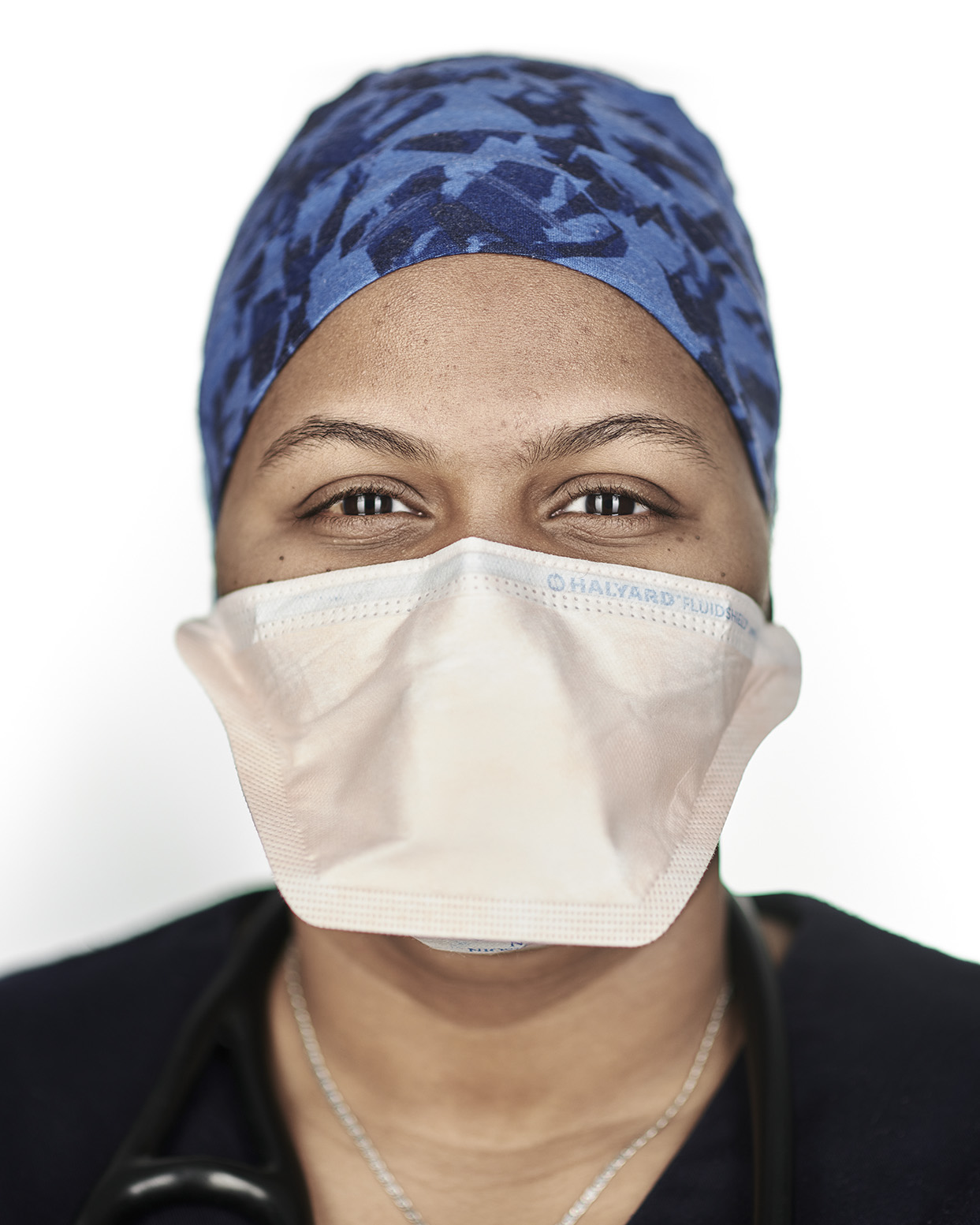
Lenise Varela, Tshepong, North West. (Photo: Thom Pierce)
Lenise Varela: Doctor, North West
Dr Lenise Varela has just finished a 25-hour shift when she comes to meet us. Even after an incredibly long day Varela is beaming at us from behind her mask.
The 31-year-old has been working with Covid-19 patients since May, when Klerksdorp-Tshepong Hospital in Klerksdorp instituted its first Covid-19 ward. By June the hospital had set up its Covid-19 ICU ward. Tshepong hospital has been in the thick of things for a while. “We’ve had relatively mild cases, but the patient turnover has still been very high,” said Varela.
The inability to interact on a more personal level with family members, due to protocols and regulations of infection control, has been particularly challenging for the young doctor. She has always appreciated a more holistic approach to treatment that allows family members and doctors to work hand in hand in supporting recovering patients.
“Normally, we rely on a patient’s family to assist us in the treatment process. We are able to speak to family members in person and explain what is happening to their loved ones. Those interactions play a huge role in a patient’s treatment process. But at the moment that link has been broken. We can speak to people over the phone, but when they have not seen the patient in person it’s hard for them to have a picture of their deterioration or progress,” she explained.
Without feeling they have been part of their loved ones’ illnesses, families often struggle to accept the news that a loved one did not make it.
“We had a patient who didn’t make it. We alerted the family and drew up all the paperwork. When the family arrived and attended to the paperwork, they noticed that the patient’s name was misspelt. All the other details were correct apart from that one error, but based on that the family refused to accept that it was their relative who had passed on,” recalled Varela.
Due to the strict protocols and regulations, families have had to accept not being able to be with their loved ones as they battle through their illness. For patients the isolation is equally brutal, if not more so, and sometimes the doctors bear the brunt of that disconnection.
“Some patients don’t always understand why they have to be isolated. Because we are the only people they see, we become the face of Covid-19. We become the enemy,” said Varela.
After beating the virus herself, Varela has a deeper understanding of what it’s like to be infected with the coronavirus. Although her symptoms were mild, Varela said that it had been a debilitating experience.
“People think it’s just a bad flu, but it’s not. I felt like I had run a marathon every single day,” she said.
Even though the young doctor has made a full recovery, she is still anxious about getting ill again. “This is a new virus and there are so many uncertainties at the moment. We don’t know how long the immunity will last.”
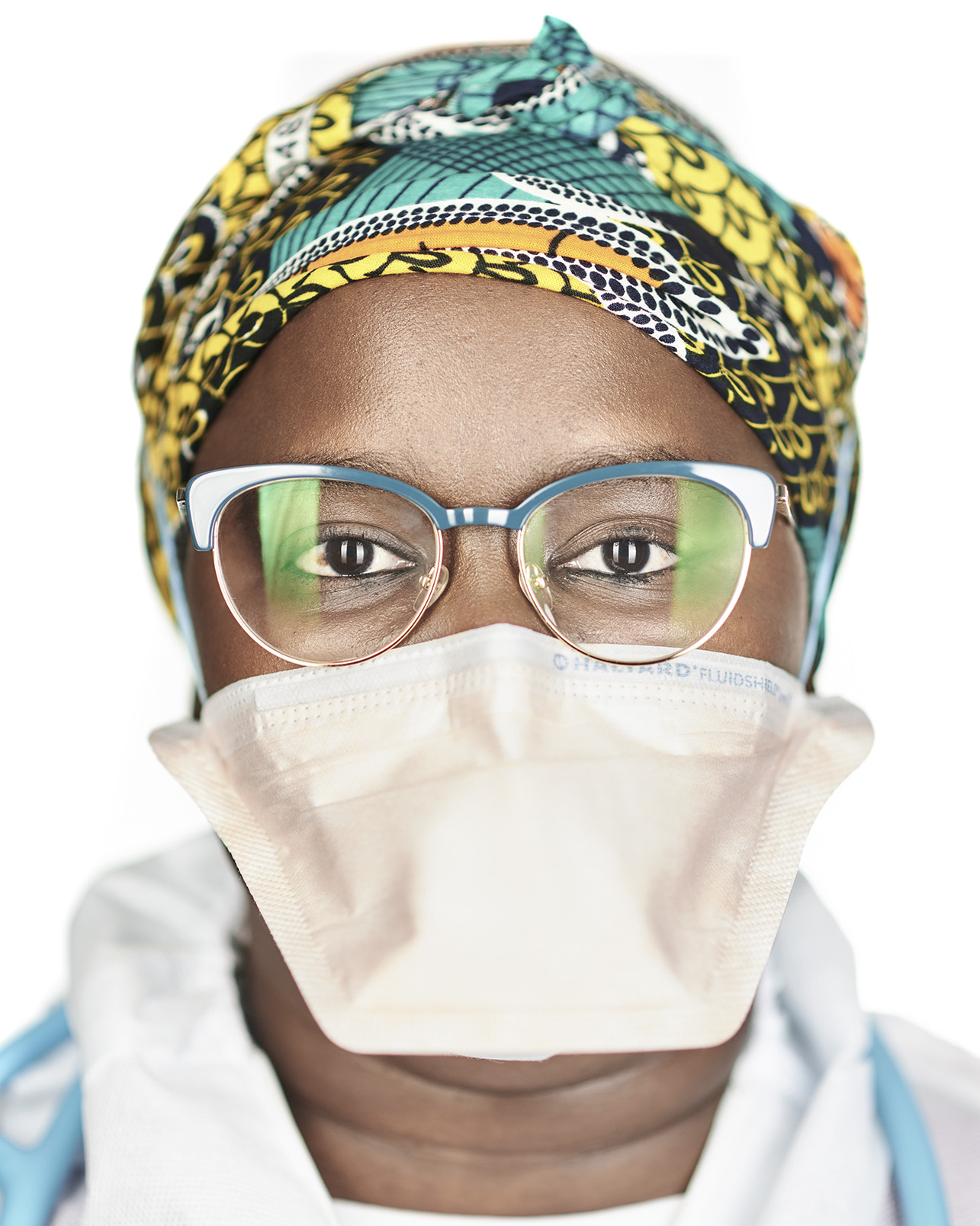
Kagiso Motse, Rustenburg, North West. (Photo: Thom Pierce)
Kagiso Motse: Doctor, North West
“In an environment where playing politics with people’s lives is an accepted norm, the pandemic placed me in a unique position to decide which mountains I was prepared to die on. From the unfair suspension of Prof Ebrahim Variava [at Tshepong Hospital in Klerksdorp], unfair blame placed on a friend and colleague, the [issue of] accessibility of appropriate PPE for all at-risk staff members, and [the issue of] access to quality healthcare for patients, I learnt that I could not be silent in the face of injustice. I had to speak my truth, even if my voice quivered. My integrity is defined by my ability to make choices and act in a manner which is in accordance with my principles and values. And that is not always easy. I’ve become an accidental activist.”
For many healthcare workers the pandemic has presented numerous challenges, both in the workplace and their personal lives. However, it has also been an opportunity for many to learn new things about themselves and discover strengths they never knew they had. Kagiso Motse is now proud to be an “accidental activist” and to put the lives of those who matter most first.

Thobile Zulu, Durban, KwaZulu-Natal. (Photo: Thom Pierce)
Thobile Zulu: Flight paramedic, Red Cross Air Mercy Service, KwaZulu-Natal
“Most of our work is very labour-intensive. We do a lot of lifting, pulling and pushing, and doing that in N95 masks is quite challenging. We also now have to do our work in full body suits which can sometimes be uncomfortable, but these things we have to do in order to keep ourselves safe during this time.”
As first respondents, paramedics have always had a tough job whether it’s on land or in the air. What is already a hard job has been made even harder by the onset of the Covid-19 pandemic. Before, Thobile Zulu and her team only had to worry about keeping their patients alive, but now they are faced with the task of also looking after their own wellbeing when on rescue missions. DM/MC
Read Episode 1 here, Episode 2 here and Episode 3 here.
Nomatter Ndebele is a writer who specialises in human interest stories. She is passionate about people and telling their stories in a way that inspires human connection. When she isn’t writing she does work in access to human rights and youth development. Nomatter has been a finalist in the Discovery Health Journalism Awards. Thom Pierce is a British photographer, currently based in Johannesburg, South Africa. His work explores the line between documentary, art and portrait photography to engage with humanitarian issues; through photographic essays, installations and exhibitions. He is passionate about human rights and using photography as a tool to connect an audience to issues of injustice. Over a period of years, his work has developed to become primarily focused on the art of activism through photography. He has won several awards for his work and has previously been chosen as a finalist in the Magnum Photography Awards and selected for the Taylor Wessing Photographic Portrait Prize Exhibition at the National Portrait Gallery in London.
"Information pertaining to Covid-19, vaccines, how to control the spread of the virus and potential treatments is ever-changing. Under the South African Disaster Management Act Regulation 11(5)(c) it is prohibited to publish information through any medium with the intention to deceive people on government measures to address COVID-19. We are therefore disabling the comment section on this article in order to protect both the commenting member and ourselves from potential liability. Should you have additional information that you think we should know, please email [email protected]"




 Become an Insider
Become an Insider